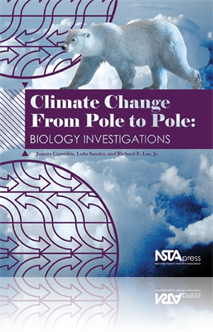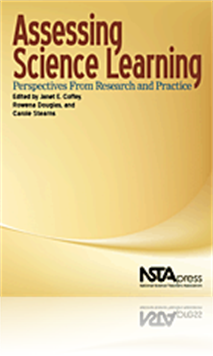All Book Chapters
Book Chapter
Rising air temperatures have changed the extent and timing of sea ice formation in the Arctic, forcing some polar bear populations to go longer each year without food. In this activity, students assume the role of graduate students advising an intern...
Book Chapter
Carrion: It’s What’s for Dinner
The restoration of wolves to Yellowstone National Park after a 70-year absence created a natural experiment on the ecological effects of top predators. In this activity, students use mathematical models to explore how carrion from wolf kills can redu...
Book Chapter
Songbirds tend to breed at the same time their primary prey is most abundant. Climate warming appears to be disrupting this match, causing reproductive failures in some species. Scientists have detected the consequences of warming for birds primarily...
Book Chapter
Pollen allergies are becoming more prevalent globally, in part because of the effect of climate on pollen-producing plants. In this problem-based learning activity, students assume the role of public relations specialists contracted to communicate th...
Book Chapter
Animal Kingdom: Shark Advocate
Most sharks are the top predators in their ecosystems, yet they are often at the bottom of the conservation priority list. Because they are underprotected and exceptionally slow growing, and therefore vulnerable to overfishing, most of the world’s ...
Book Chapter
Improving Learning in Science With Formative Assessment
In recent years, the No Child Left Behind law has focused attention on student achievement in science across the United States, but there are more important reasons for being concerned with student achievement. The focus of this chapter is about how ...
Book Chapter
Using Standards And Cognitive Research To Inform The Design And Use Of Formative Assessment Probes
In their work with teachers, the authors use a process called Curriculum Topic Study (CTS) developed through our National Science Foundation–funded project, “Curriculum Topic Study–A Systematic Approach to Utilizing National Standards and Cogni...
Book Chapter
Assessment Linked To Science Learning Goals: Probing Student Thinking Through Assessment
The focus of this chapter is on how to design science assessment items that are linked to the content standards in Benchmarks for Science Literacy and the National Science Education Standards....
Book Chapter
Assessing Science Literacy Using Extended Constructed-Response Items
The authors’ goal in this chapter is to provide teachers with information that will make them better formative and summative assessors; better judges of the quality of state, national, and international assessments that their students experience; a...
Book Chapter
Aligning Classroom-Based Assessment With High-Stakes Tests
In this chapter, the authors will focus on the types of assessments found on high-stakes tests that can and should be used in middle-grades science classrooms. The authors provide a model for analyzing the kinds of information these types of assessme...
Book Chapter
This chapter summarizes some of the findings and recommendations of the National Research Committee (NRC) on Test Design for K-12 Science Achievement and is based on the committee’s final, book-length Report—Systems for State Science Assessment (...
Book Chapter
From Reading To Science: Assessment That Supports And Describes Student Achievement
This chapter is based on a presentation made to the National Science Teachers Association’s conference on assessment, “Science Assessment: Research and Practical Approaches for Grades 3-12 Teachers and School District Administrators”, held in N...
Book Chapter
What Research Says About Science Assessment With English Language Learners
This chapter addresses what research says about science assessment with English Language Learners (ELL) students. Specifically, the authors draw from our ongoing research and development efforts to promote science and literacy achievement of ELL stud...
Book Chapter
This chapter describes how elementary science staff in the Seattle Public Schools extended the district’s infrastructure and support system to help teachers prepare their students for the state assessment tests (Washington Assessment of Student Lea...
Book Chapter
Linking Assessment To Student Achievement In A Professional Development Model
This chapter reviews assessment as a key component in a professional development model implemented in a National Science Foundation–funded program entitled Toledo Area Partnership in Education: Support Teachers as Resources to Improve Elementary Sc...




